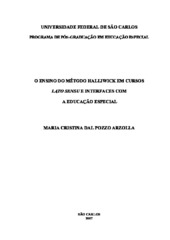O ensino do método Halliwick em cursos Lato sensu e interfaces com a educação especial
Abstract
Aquatic therapy is a method of prevention and rehabilitation of handicap. Its specialized
learning methods enables motor training and independence in the fluid environment and,
therefore, provides a better life quality to individuals. Among the methods used for water
interaction with handicapped people, the Halliwick method encompasses a sequence of
motor learning pleasurously and actively developed through music and games. With the
expansion of aquatic therapy in Brazil, the Halliwick method has been taught in
Improvement and Graduate programs in public and private universities. This study
investigated the content and teaching method of the Halliwick in Lato sensu courses in the
state of Sao Paulo. A qualitative research based on Dialectical Materialism was developed.
The praxis category was used to direct the analysis and the confrontation with empiric
categories, constructed a posteriori. The sampling involved 3 Lato sensu courses (shortterm
graduate programs). Questionnaires were answered by students, and professors from
these programs were interviewed, and so were international instructors from Improvement
courses. Data were crossed by the Triangulation technique and systematized by Idea
Association Maps. Results show that students need to redo the Halliwick method due to
unsatisfactory number of hours of the course (16 hours), which presents superficial contents
and excessive amount of exercises. Students consider that they need to feel safer with and
have more experience in handling handicapped people in future interventions in fluid
environment. We conclude that interactional methodologies allow for the compensation of
the lack of experience by students and provide a systematization of a teaching procedure of
the Halliwick method in graduate programs, defining a form that contributes, as a product,
to the inclusion of handicapped people.
